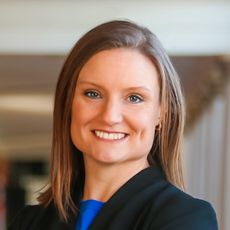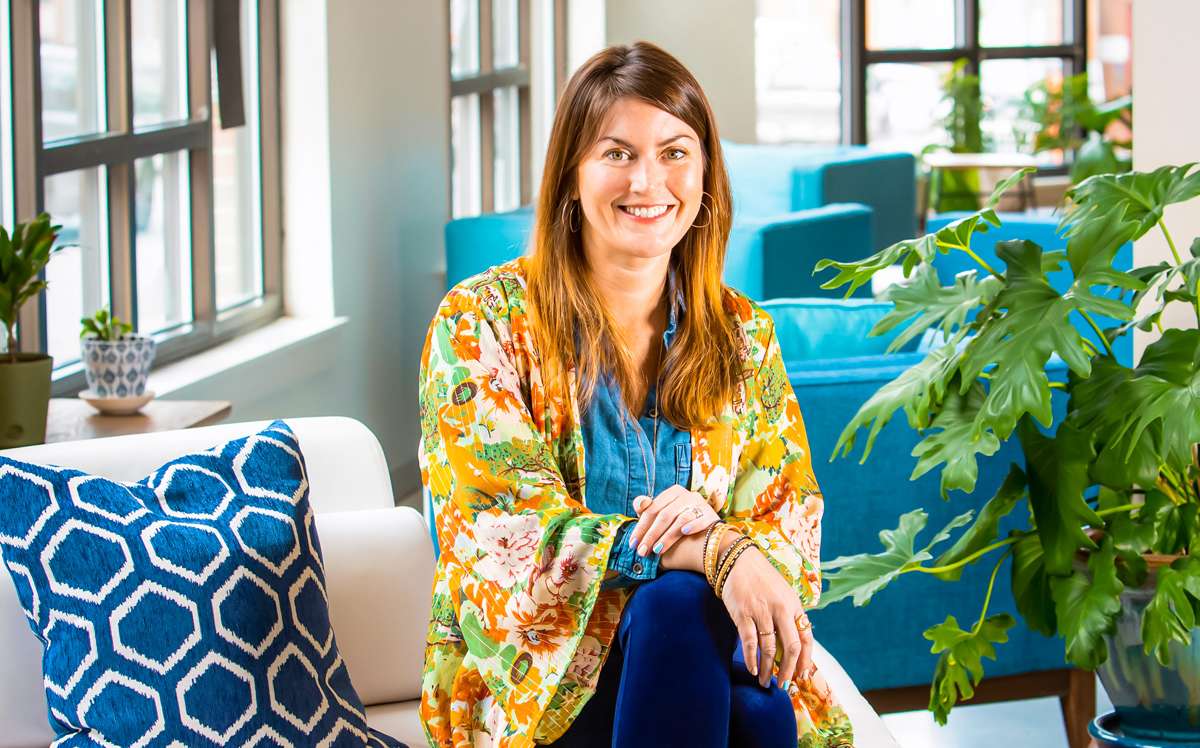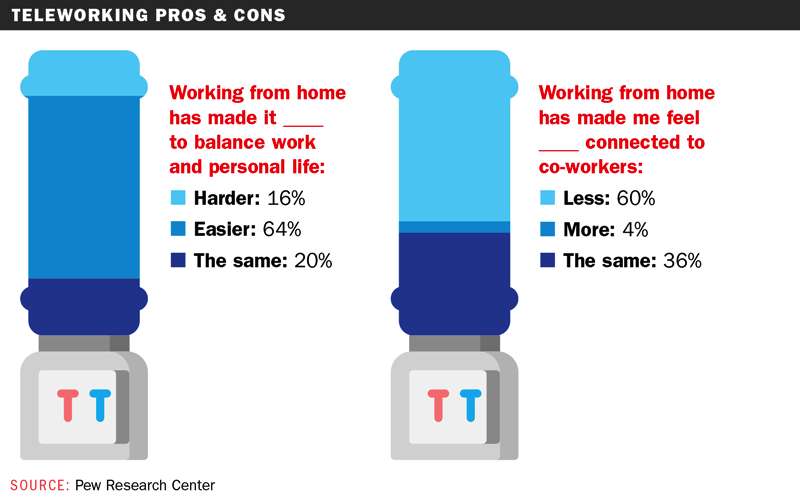
'Water cooler talk' takes a new turn: How hybrid work is changing Maine's workplace communication
One Mainer works the phone from her car, another sees more of her cat than her colleagues, and a third rarely sets foot in the state.
Welcome to the new hybrid reality, where professionals split their time between office and remote work — increasingly out of choice rather than necessity, as in year one of COVID. The shift is reshaping workplace communication in Maine and beyond, creating new opportunities — and challenges — for employees and employers.
“Hybrid is not the future of work. It is how we work now,” says Lisa Whited, founder of Portland-based consultancy Workplace Transformation Facilitation and a senior associate with New York-based Advanced Workplace Associates. “Work is work and what is important is communication and results, not where we are when we work.”
One example is Gretchen Johnson, who started a new job at Portland-based law firm Preti Flaherty in April 2020 when everything was shut down and continues to work mainly from her basement in Cape Elizabeth, kept company by her cat, Rollo.
“I would go into the office so much more if there were enough people to talk to,” says Johnson, who as the firm’s director of strategic partnerships works with attorneys in Portland, Boston and Concord, N.H., many of whom she has met only on screen. The getting-acquainted process is “as needed instead of everybody all at once … It’s a slower journey.”

Some 700 miles south, in Charlottesville, Va., Bernstein Shur’s Amanda Ames is among 45 people hired by Maine’s largest law firm during the pandemic, and the first outside of New England with no plans to move here. Working mainly from home and sometimes from an office in town, Ames counsels educational institutions nationwide on harassment and discrimination policies.
While she visited the firm last summer in Portland, she’s now used to seeing colleagues — and clients — on Zoom and wonders how the dynamic will change as work habits evolve.
“A lot of my experience has been similar to that of my teammates even though they are more closely located geographically,” she says. “When people are going into the office a little more, I think it will be even more important to maintain the social connections.”
Pluses and minuses
Nationwide, employees who went remote during COVID are reluctant to give up the newfound flexibility. That’s documented in a report released Feb. 16 by the Washington, D.C.-based Pew Research Center. It found that six out of 10 adults polled in late January with remote-capable jobs are working from home all or part of the time. The proportion is lower than in October 2020 but triple what it was for people who teleworked frequently pre-COVID.
One conclusion: While droves of professionals worked from home initially because of closed offices, today it’s more of a choice, with close to half of teleworking newbies reporting greater productivity.
On the flip side, six out of 10 people now working from home at least some of the time with minimal pre-pandemic telework experience now feel less connected to co-workers, which experts blame in part on fewer in-person interactions.
“Human beings are social animals,” says Dr. Amy Wood, a Portland-based psychologist and executive coach. “We don’t just need conversation with our valued colleagues and friends, we need connection … You’ve got to be face-to-face for important conversations.”
Nancy Marshall, head of Augusta-based Marshall Communications, feels the same way as a self-described social butterfly who prefers in-person meetings, especially with new clients.
“There are chemicals that go back and forth between human beings when you’re in person, and I think you get to know a person much better when you’re literally face to face, not through a computer screen,” she says.
When phone calls are required and she needs an escape from the daily email crush, her car is her venue of choice: “When I’m driving, I can do some of my best phone work because I’m not checking my emails.” As a publicist, Marshall says she’s found it easier over the past two years to forge new relationships on Twitter, including Ryan Howe, director of operations for the Holy Donut. Though she’s never met him, Marshall says she finds herself liking and commenting on his tweets, adding: “I don’t know if this would have happened pre-pandemic, but I suspect not.”

Similarly, Portland-based business communication coach Kymberly Dakin-Neal of Voice into Learning LLC has struck up new global connections during the pandemic, including through virtual writers’ groups as she pens a book about listening modalities..
“I’ve made some really good friendships with people I’ve never met in person, and that’s because of this technology,” she says. Dakin-Neal is a communication technology entrepreneur in her own right, as the developer of a web application called Nugget to bookmark, record and transcribe online meetings. Though she sold the app to Silicon Valley buyer Merry Solutions Inc., of Menlo Park, Calif., Dakin-Neal still uses it in her practice.
“So far it’s working exactly the way we designed it,” she says.
New stresses and lingo
The new hybrid working arrangements have created new stresses about scheduling (Zoom vs. Teams, phone vs. video, calendar-invite turf wars); they have also spawned a language of their own, with terms like “online onboarding” and “Zoom fatigue” becoming part of the vernacular. Many of the new phrases feature regularly in email and text messages and even cheeky word-bingo games for virtual gatherings.
“I said, ‘Let’s take it offline’ the other day and wanted to slap myself,’” says Katie Shorey, part of a three-person Live + Work in Maine team splitting her time between a new office in Brunswick and, in Portland, the Cloudport coworking hub and Roux Institute. One day, she worked from the Shawnee Peak ski area for a few hours before going to visit her parents.
“We have a hilarious group text thread,” Shorey says of the Live + Work in Maine trio, “but we really love being together in the office these days.”
And while Whited’s reaction to the use of “Teams” as a verb (as in “I’ll [Microsoft] Teams you later” is to “LOL” (“Laugh Out Loud”), E2Tech Executive Director Martin Grohman cringes at any email “unpacking” reference.
“It sounds elitist to me,” Grohman says. “If your snowmobile won’t start, no one ever says, ‘There’s a lot to unpack here.’” As for his work locale, while he prefers E2Tech’s floating desk at Biddeford’s Think Tank coworking space, he conducts online forums from a quiet office he hates because it’s cluttered.
From the water cooler to Slack channels
Among small employers who’ve embraced the hybrid model is iBec Creative, a Portland-based web design and digital marketing agency for brands including Shawnee Peak and the Holy Donut. With about a third of its 18 employees coming into the office most days, a third coming in twice a month and a third fully remote, the agency has adopted a “remote-first” policy for all staff business and social gatherings to put everyone on equal footing.

“Even though some people may be sitting around a conference table, we all have our laptops, so our individual faces are on screen, and we have a microphone that allows everyone to be heard clearly,” says Becky McKinnell, the company’s founder and CEO. “Remote-first meetings allow all of us to have the same audio and visual so there is less of an ‘us versus them’ vibe.”
The firm has also shifted virtual coffee check-ins, happy hours and other social activities to a mix of in-person and remote while chatting on the Slack messaging app on topics including pets, positive vibes and even pumpkins, during last year’s carving contest.
“Slack helps coworkers get to know each other even better,” McKinnell says, “because it creates transparency for conversations. Most of our water-cooler-type chat is on Slack so everyone can chime in.”
Large employers
Large employers operating on a hybrid model include MEMIC, Tilson and engineering firm Woodard & Curran Inc. All are headquartered in Portland with employees in multiple states.
“I have clearly signaled to people that I think there’s value in being in an office, but I’m not going to tell people to be there X hours per week,” says Michael Bourque, president and CEO of workers’ compensation insurer MEMIC.
During the pandemic when the company hired close to 100 people, one thing he’s missed most about in-person interviews is having lunch. “We stand in line and grab a sandwich and try to get those little bits and pieces about someone’s personality,” he says. “You don’t get that on video.”
Like many of his managers, Bourque makes himself available on the WebEx video platform and aims to answer every message.
“We’ve had some big issues come up during this time period, and it’s a nice way to invite interaction and to respond,” he says.
Meanwhile at Tilson, a network-deployment and IT professional services firm with 650 employees nationwide including 180 in Portland, employees are coming into the office more. Some fly in from elsewhere and often join video meetings from the plane.
“We still have virtual meetings all day long across the country,” says Adria Horn, Tilson’s executive vice president for workforce.
While working from home saves her time, Horn finds it’s no substitute for the communal experience.
“I appreciate the natural opportunity to start a meeting by not just starting the business of the meeting,’’ she says. “On video you don’t get those ice-breakers, and starting five minutes late doesn’t matter.”

For Rachel Gilbert, diversity, equity and inclusion manager at Woodard & Curran in Andover, Mass., Tuesdays through Thursdays are office days while she avoids heavier traffic by working from home Mondays and Fridays. “I fully intended to go back to the office full-time, but then I realized I have such a great set-up at home that I have perfected over the past two years.”
Back at Gretchen Johnson’s home office in Cape Elizabeth, she keeps accessories on hand to hop on a video call at short notice. That includes lipstick and a scarf, a necklace or a pair of earrings she can quickly throw on “so I’m always Zoom-ready.”

















0 Comments